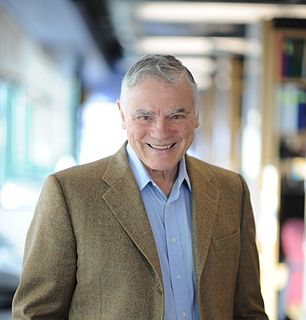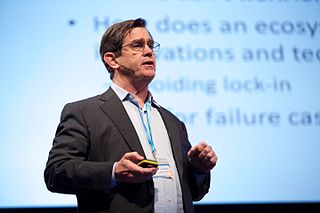A Quote by Leroy Hood
My fundamental philosophy is that you owe it to society to transfer to them any knowledge you have that might be useful.
Quote Topics
Related Quotes
We have heard of a Society for the Diffusion of Useful Knowledge. It is said that knowledge is power, and the like. Methinks there is equal need of a Society for the Diffusion of Useful Ignorance, what we will call Beautiful Knowledge, a knowledge useful in a higher sense: for what is most of our boasted so-called knowledge but a conceit that we know something, which robs us of the advantage of our actual ignorance? What we call knowledge is often our positive ignorance; ignorance our negative knowledge.
The notion that "applied" knowledge is somehow less worthy than "pure" knowledge, was natural to a society in which all useful work was performed by slaves and serfs, and in which industry was controlled by the models set by custom rather than by intelligence. Science, or the highest knowing, was then identified with pure theorizing, apart from all application in the uses of life; and knowledge relating to useful arts suffered the stigma attaching to the classes who engaged in them.
I feel that all knowledge should be in the free-trade zone. Your knowledge, my knowledge, everybody's knowledge should be made use of. I think people who refuse to use other people's knowledge are making a big mistake. Those who refuse to share their knowledge with other people are making a great mistake, because we need it all. I don't have any problem about ideas I got from other people. If I find them useful, I'll just ease them right in and make them my own.
Rhetoric is useful because the true and the just are naturally superior to their opposites, so that, if decisions are improperly made, they must owe their defeat to their own advocates; which is reprehensible. Further, in dealing with certain persons, even if we possessed the most accurate scientific knowledge, we should not find it easy to persuade them by the employment of such knowledge. For scientific discourse is concerned with instruction, but in the case of such persons instruction is impossible.
This society in which knowledge workers dominate is in danger of a new "class conflict" between the large minority of knowledge workers and the majority of workers who will make their livings through traditional ways, either by manual work... or by service work. The productivity of knowledge work - still abysmally low - will predictably become the economic challenge of the knowledge society. On it will depend the ability of the knowledge society to give decent incomes, and with them dignity and status, to non knowledge people.
It started becoming clear to me how one might have views about the nature of mind and of knowledge which are empirically informed. This way of thinking about philosophical theorizing makes sense of how philosophy might be a legitimate intellectual activity, in a way that a good deal of the armchair philosophy, I believe, cannot.
There exists in society a very special class of persons that I have always referred to as the Believers. These are folks who have chosen to accept a certain religion, philosophy, theory, idea or notion and cling to that belief regardless of any evidence that might, for anyone else, bring it into doubt. They are the ones who encourage and support the fanatics and the frauds of any given age. No amount of evidence, no matter how strong, will bring them any enlightenment. They are the sheep who beg to be fleeced and butchered, and who will battle fiercely to preserve their right to be victimized.
Science...has become identified with a philosophy known as materialism or scientific naturalism. This philosophy insists that nature is all there is, or at least the only thing about which we can have any knowledge. It follows that nature had to do its own creating, and that the means of creation must have included any role for God.
You grow up and recognize that in any educated secular society, there's no excuse for ignorance. You have to recognize in yourself, and challenge yourself, that if you see racism or homophobia or misogyny in a secular society, as a member of that society, you should challenge it. You owe it to the betterment of society.
No one has a monopoly on knowledge the way that, say, IBM had in the 1960s in computing, or that Bell Labs had through the 1970s in communications. When useful knowledge exists in companies of all sizes and also in universities, non-profits and individual minds, it makes sense to orient your innovation efforts to accessing, building upon and integrating that external knowledge into useful products and services.





































